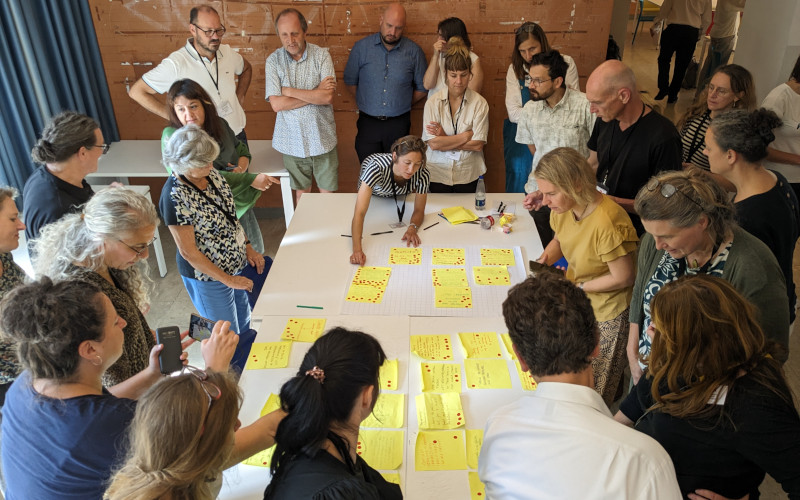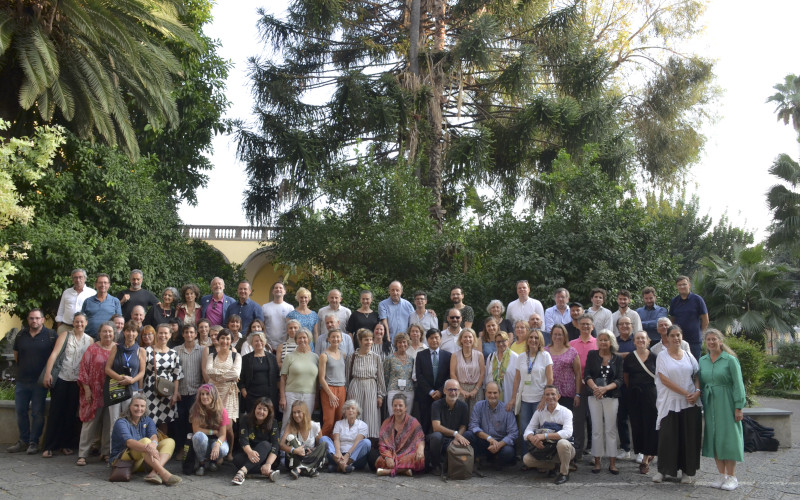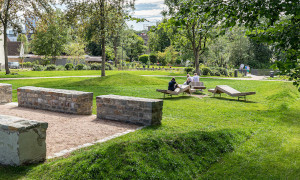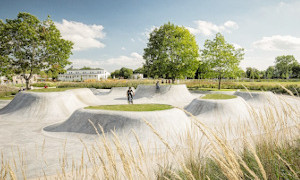By Steffi Schüppel
I first came into contact with the bdla over 20 years ago, at the New Year's reception of the Hesse regional group. I still have fond memories of the wonderful event, a lovely party in a good atmosphere with so many like-minded people. I've stayed involved ever since.
I was very impressed by the interaction between colleagues and the lively professional exchange during my student internship in the Taunus region. The next internship during my studies took me to the USA, and of course I was curious to see what was going on in the American professional association ASLA.
When I moved to Switzerland a few years later, it was clear to me that I wanted to be part of the professional association there too, to see what moves my colleagues there and how they tackle the challenges of everyday working life, but also to see how the profession is doing and how Swiss landscape architects are advancing the profession.
While I had previously worked as a freelancer in Germany, I was now employed at the university in Switzerland. This change of perspective was very exciting for me, and the environment at the university was something new. And the active work at the BSLA also opened up new perspectives for me. Since then, I have always found changing my perspective very enriching. It has probably also had a lasting influence on my daily work and my self-image as a landscape architect.
For a good year and a half now, I have been representing the bdla as the international spokesperson at European and international level in the IFLA, the International Federation of Landscape Architects. Together with Gwendolyn Kusters, board member of the bdla Lower Saxony Bremen and the Chamber of Architects of Lower Saxony, who represents the BAK in the IFLA as an official delegate, we have followed in the footsteps of Prof. Fritz Auweck. He worked in IFLA for Germany for many years and played a key role in shaping its fortunes. Quite big shoes to fill, but a colleague from England recently commented that it was not about filling the shoes, but about moving forward in the interests of the cause.
European and international issues are becoming increasingly important and are also influencing current day-to-day business. The range of content is broad, the activities diverse. Topics relating to professional practice and training as well as public relations work occupy us at European and international level in much the same way as they do in Germany.
Steffi Schüppel
bdla spokesperson for international affairs
Shortage of skilled workers and young talent
For example, a high-quality education that optimally prepares students for the job market is not only a concern for the bdla in Germany. Numerous study programs for landscape architecture, from which you can choose according to your interests and desired focus, accredited by independent accreditation institutions - this is by no means the case in all countries. An important concern at European level is therefore a Common Training Framework (CTF), which defines the cornerstones of landscape architecture education and the recognition of study programs by IFLA Europe. This will remove obstacles to the free movement of persons and services for landscape architects, make it easier to mutually recognize diplomas, examination certificates and other qualifications, and open up the job market. These are important aspects in view of the shortage of skilled workers and the issue of young talent.
These points have been the subject of intensive discussion in IFLA Europe for some time, and initial results are available. However, these instruments can only be effective if everyone joins in. In concrete terms, this means that recognition by IFLA Europe should also be the goal for German study programs. How this can best be achieved in the area of tension between pan-European efforts and the specific situation in Germany is currently being discussed with the new IFLA Europe Vice-President for Education, Attila Toth (Slovakia).
Working groups and fellow campaigners
An intensive exchange on various specialist topics takes place in numerous working groups. Position papers are drawn up, events are organized, contacts are made and maintained with politicians and administrators, and the profession is reported on and promoted in public.

It is a great opportunity to discuss all these topics with colleagues from other countries and to learn that the issues are usually quite similar or sometimes quite different in the regional context, to compare approaches to solutions and to check their applicability in one's own country - not to reinvent the wheel again and again. You don't have to be a delegate to work in the working groups; any member of a national association can participate. And here too - as in the bdla - fellow campaigners are always welcome. I speak from experience, as a member of the "Agricultural Landscapes" working group in IFLA Europe and as head of the working group for the 75th anniversary of IFLA at international level.
The Agricultural Landscapes working group deals with the role of landscape architects in the context of agriculture. The first project was a multilingual flyer outlining this role. With a photo competition, we drew attention to Europe's agricultural and cultural landscapes, their significance, special features and aesthetics. Webinars offer a platform for experts from different countries to exchange ideas with representatives of the EU Commission, the FAO (Food and Agriculture Organization of the United Nations) and other institutions.
For IFLA's 75th anniversary, I was then faced with the challenge of leading the activities myself. Together with colleagues from the IFLA regions Europe, Americas, Middle East, Africa and Asia-Pacific as well as representatives of the IFLA Executive Board, we developed a diverse program for the anniversary year 2023: Events online or hybrid, the Greenbook as an anniversary publication, an artistic competition on the topic of "Landscape of the Future", contributions to the World Congress and the regional conferences in the IFLA regions, to name but a few. The collaboration with my colleagues was wonderful, and despite the sheer volume of tasks (on a voluntary basis, mind you!), it was characterized by great commitment, pleasant cooperation and strong motivation. Receiving a "Certificate of Appreciation" from IFLA at this year's World Council in Nairobi was a wonderful recognition of the work done by the whole team.

Taking the perspective of others again
The challenges facing society do not stop at national borders. Climate change and the biodiversity crisis show this very clearly. It seems only logical to network with landscape architects worldwide, to extend the network to neighboring disciplines and to jointly bring our concerns and expertise to the attention of politicians and administrators.
In addition, we can gain so much if we stay in contact with our colleagues across national borders, on a professional level, but often also simply on an interpersonal level, if we take on the perspective of others from time to time.
Author: Steffi Schüppel, landscape architect bdla AIAPP, CATTANEO | SCHÜPPEL urban design and landscape architecture, Dresden, bdla spokesperson for international affairs. The text was published in the bdla association magazine "Landschaftsarchitekten" 4/2023.
- Latitude: 0
- Longitude: 0


